
(Photo: Aaron Brown/BikePortland)
Welcome to the latest dispatch from our Transportation Research Board Annual Meeting Special Correspondent Aaron Brown, who was in D.C. covering the event thanks to sponsorship from the Transportation Research and Education Center at Portland State University (TREC at PSU). See past coverage here. (Note: Views expressed by the author are his own and do not reflect those of TREC at PSU.)
Transit equity
Aaron Golub’s presentation was one of my personal highlights of the conference. I attended a seminar in which Dr. Golub, a Professor of Urban Studies and Planning and the Director of the Toulan School of Urban Studies and Planning at Portland State University, shared findings from his ongoing research about the equity implications of TriMet’s shift towards electronic fares. His presentation, “An Equity Assessment of Smart Mobility Systems in Portland, Oregon”, was featured in a session titled, “Taking Off the Rose-Colored Glasses: Equitable Access to 21st-Century Mobility Options”.

(Photo: PSU)
I wrote a bit in my previous dispatch about the challenges and opportunities that the huge amount of new data in transportation presents to researchers and governing bodies, and Dr. Golub’s research represents yet another important set of questions on how the benefits and burdens of these changes are distributed.
Golub co-authored research with former OPAL Environmental Justice Oregon staffers Vivian Satterfield and Jai Singh that studied how these changes in ticket fares impacted transit-dependent riders. By partnering with OPAL, Golub was able to distribute surveys to low-income, transit dependent riders in east Portland. The findings shed light on the ways in which these riders are — and are not — well-served by the new fare system. The results? Lower income survey respondents were less likely to have access to drivers’ licenses, bank accounts, smart phones, and credit cards. Assumptions that access to these institutions are ubiquitous can make taking transit more difficult and less accessible to the very communities that need it most.
Similarly, many of the wayfinding apps and signs are rarely displayed in languages other than English – this creates significant barriers for many low-income and communities of color. And remember, here in Oregon, non-citizens can’t legally obtain driver’s cards — this only makes it more imperative that Portland’s transit system is easier for immigrants without papers to navigate.
Golub’s findings resonated with me. I was excited to see an institution like PSU deliberately pursue research in partnership with frontline community groups who have the most knowledge and information about their needs. These are the type of collaborations that ensure those that are most likely to fall through the cracks of TriMet’s governance are given a chance to speak up and change policy. It certainly falls within the framework of the PSU motto of, “Let Knowledge Serve the City.”
For more information about Dr. Golub’s findings, check out the slides from a similar presentation Dr. Golub’s gave during a TREC Friday Seminar Series event this past September; you can also watch the presentation online.
Advertisement
Poster Sessions
While the cavernous Walter E. Washington Convention Center hosts dozens of sessions, the TRB Conference also provides a unique opportunity to meet directly with academics and students one-on-one during informal “poster sessions.”
Squirreled away in the basement of the adjacent Marriott Hotel, hundreds of researchers cycle through the presentation space every two hours during the conference to put their latest research and findings on display on a poster, and make themselves available to conversation and engagement with whoever chooses to walk by. It’s startlingly democratic (and a little intimidating) to walk down an aisle with dozens of researchers proudly beaming while gesturing to the maps and analyses that prove their findings, and be given the opportunity to ask questions about it.
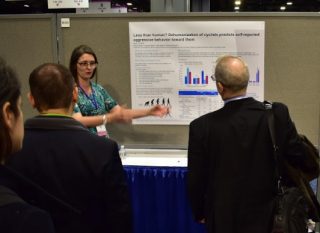
The poster sessions are typically arranged so that similar research is shown at the same time and at the same location. I never knew there could be so many academics with a particularly niche field of study — asphalt design, LIDAR technology for autonomous vehicles, airline deregulation’s impacts on mid-sized Chinese cities, pedestrian safety — all in one space.
I visited on Wednesday morning to catch the “Bicycle Transportation Research” Poster session, which featured over seventy-eight different studies on bicycles and bicycling. Portland and Oregon-based academics had a strong showing (this is unsurprising in-and-of-itself, but the fact it was held the morning after TREC at PSU’s lively evening reception made it more impressive). Dr. Alex Bigazzi, a former PSU student and current professor with the University of British Columbia, was present to talk about three different posters for different research projects he authored or co-authored (“Utilization of Secure Bicycle Parking Rooms in Multi-Unit Residential Buildings”, “Industry Stakeholder Perspectives on the Adoption of Electric Bicycles in British Columbia”, and “Toward Agent-Based Microsimulation of Cyclist Following Behavior: Estimation of Reward Function Parameters Using Inverse Reinforcement Learning”).
Researchers are finding all sorts of ways to analyze quantitative data to learn more about what makes for great urban bicycle networks, how the introduction of e-bikes changes how people use bikeshare systems, and the extent to which painted and separated bike lanes make people feel safer. If you’re feeling some Monday morning duldrums and looking for an internet wormhole to fall down, check out the long list of abstracts from Wednesday’s sessions.
It’s was also heartening to see numerous scholars from Chinese Universities presenting their research – I think the normative American bike transportation geek (myself included) is wholly undereducated about the massive urbanization underway in China and the number of these cities doing remarkably radical things with bikes, bikeshare systems, and public transit. The growing field of research (and researchers) is good news for all of us who want to learn the best practices for designing cities for bikes from every corner of the world — not just Portland, Amsterdam and Copenhagen.
— Aaron Brown, @ambrown on Twitter
Never miss a story. Sign-up for the daily BP Headlines email.
BikePortland needs your support.





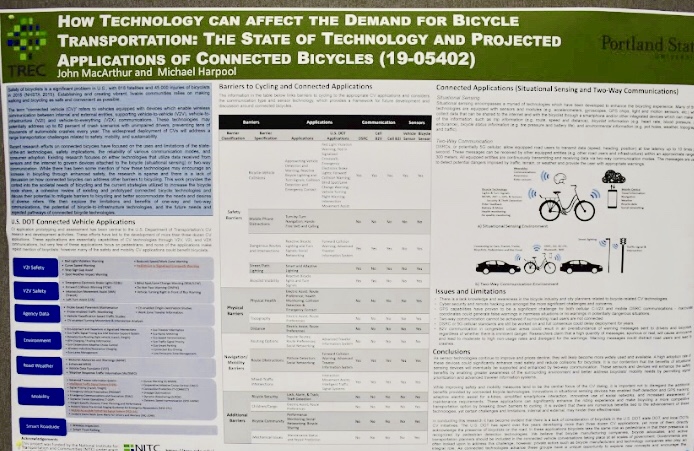
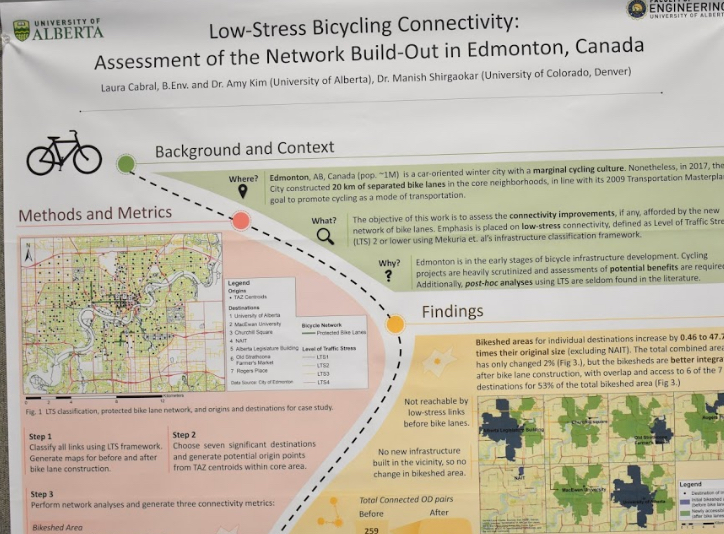
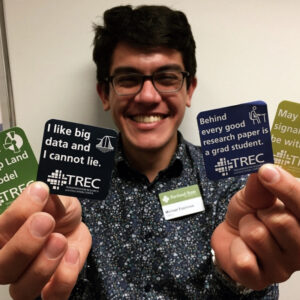

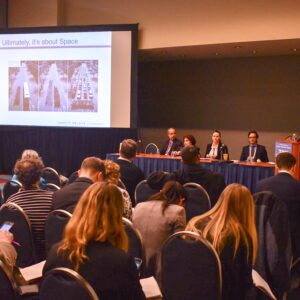
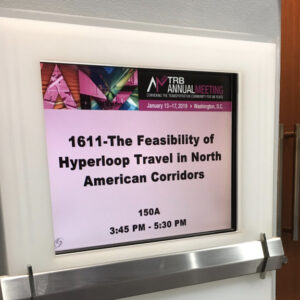
Thanks for reading.
BikePortland has served this community with independent community journalism since 2005. We rely on subscriptions from readers like you to survive. Your financial support is vital in keeping this valuable resource alive and well.
Please subscribe today to strengthen and expand our work.
Great report Aaron, thank you for sharing your insights.
The research on Hop is good to have, but the sad fact is that TriMet was told this would be the consequences before they instituted the program. We can only hope that a new board will be more open to feedback before they start a new policy.
Trimet won’t change until it is democratically accountable to its constituents. The board should be fired and elections held for board positions.
I have personally found the use of the HOP card without a credit card or bank account pretty convenient now that all the retail locations are open. (At first it was a struggle early in the roll out when some site did not know they were a partner or just not ready.) It is a lot easier than having to remember to collect coins before I want to ride especially if my bike breaks down. Though I wish the HOP panel on the bus would show the remaining balance when it get below $5.50 (or a day rate). I have used these cards in other cities for many years and TRIMET implementation seems better than average. [I will take a look at the research paper when I have a moment.]